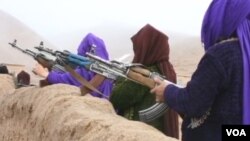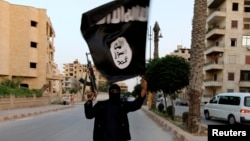A group of women in a volatile northern Afghan province has taken up arms, vowing to battle Taliban insurgents and militants fighting in the name of the Islamic State group.
Around 150 women, most of whom lost family members in battles with the Taliban in northern Jouzjan province, say they are ready to fight alongside men from their districts.
"They [militants] killed three of my sons and burned down our livelihood. Now we have come out to fight IS and Taliban," Mamlakat, a commander of one of the two women groups, told VOA's Afghan service. Like many Afghans, she used only a first name.
Afghan women are in the country's army and police forces, but the provincial female militia marks the first time since the collapse of Taliban rule in 2001 that women have vowed to fight alongside men. A female Afghan, Malala of Maiwand, is a national folk hero in Afghanistan for helping in the fight against British troops at the Battle of Maiwand in 1880. She was killed in combat.
Taliban fighters have increased their activities in many northern provinces, including restive Jouzjan — the birthplace of Abdul Rashid Dostum, the vice president of Afghanistan and a regional strongman. Taliban forces have been engaged in large-scale clashes with Afghan security forces, prompting Dostum to spend a majority of his time in the region leading anti-Taliban operations.
The armed women say they have suffered greatly and can no longer tolerate brutalities committed against them by the militants.
"They killed my brother, sister, and a nephew. That is why I took up the gun," said Nafisa, a member of the group in Darzaab district.
Another woman, whose family members were injured or killed by the Taliban, said joining the female uprising is a way of empowerment.
"They killed my cousins, injured my son, and 20 to 30 others," the woman named Khadija said. "We are fed up and took arms to fight them."
The women's group is asking for government support and assistance, and local police authorities say the government will equip the groups.
"As a representative of the provincial government, I assure you that the women will have our support. We will help them with weapons and ammunitions," said Hafeez Khashi, a local national police commander.
IS activity
It's likely that most of the fight will be against the Taliban, as IS activities in the province are harder to detect, officials say.
The so-called Islamic State's Khorasan branch has been active in eastern parts of Afghanistan for the past two years. Government forces have been engaged in fierce battles with IS militants in several districts of eastern Nangarhar province.
In addition to Nangarhar, Afghan officials say, IS has expanded to neighboring Kunar and Nuristan provinces but has "significantly been weakened" by joint Afghan-U.S. forces' counterterrorism offensives.
According to the Afghan defense ministry, IS's presence in northern provinces could not be confirmed; however, some militant groups operate under the IS name to obtain fame and money.
"They [militant groups] are trying to wage a propaganda campaign for financial gains," Mohammad Radmanesh, a spokesperson for the Afghan defense ministry, told VOA. In an effort to get financial resources, he said, some militant groups use IS's name by raising the IS flag.
The IS flag is black and white and decorated with words from an Islamic declaration of faith — known as the shahada — and a white circle meant to resemble the Muslim Prophet's seal. The Taliban flag is white with the same Arabic phrase in black.
IS claimed responsibility for the killing of seven minority Shi'ite Hazara coal miners last week in northeastern Baghlan province. Prayer leaders, known as mullahs, and religious scholars in Baghlan called on people to stand against IS, saying the group causes schisms among communities and does a "disservice to Islam."





